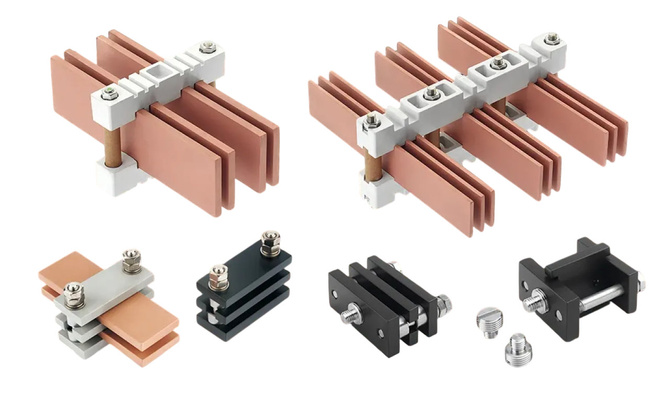Druseidt - Busbar supports, busbar holders and standoff insulators
- Druseidt - busbar supports, busbar holders and standoff insulators
Druseidt busbar supports, busbar holders and standoff insulators are reliable structural components used for the mechanical fastening and electrical insulation of busbars in switchgear, power systems and high-voltage equipment. The components we offer provide stable support and high dielectric strength, and are designed for installation in industrial environments with increased mechanical and temperature requirements.
Range of Druseidt busbar supports, busbar holders and standoff insulators
Busbar supports These are key components designed for the stable mounting of busbars, ensuring the correct phase distances. We offer supports for various busbar configurations and thicknesses. Their design allows for vertical mounting of busbars.
- Available for phase distances of 70 mm, 100 mm and 125 mm.
- They can accommodate two or three busbars per phase, depending on the thickness (e.g. two 10 mm busbars or three 5 mm busbars for a distance of 100 mm; three 10 mm busbars or two 12.7 mm busbars for 125 mm).
- Special 70 mm two-phase brackets are designed for N and PE rails.
- Made of high-quality glass fibre reinforced polyester composite.
- Halogen-free.
- Mounting height can be adjusted using spacer sleeves.
- Tested in accordance with DIN EN 61439.
- Operating voltage 1 kV AC.
- Wide operating temperature range from -40 °C to +130 °C.
- High resistance to deformation and excellent fire behaviour (UL 94 Class V-0).
- High dielectric strength (20 kV/mm) and creepage current resistance CTI 600.
Busbar Clamps These clamps are used to fasten busbars with widths from 30 mm to 120 mm. They are available in clamping versions for short, fixed busbars and sliding versions for longer sections requiring thermal expansion compensation. We offer them for both vertical and horizontal routing.
- Available for vertical and horizontal busbar routing.
- Clamping version: Provides secure mounting of one or two shorter busbars.
- Sliding version: Ideal for longer busbars, allows for thermal expansion compensation and offers simple, time-saving installation.
- Available in two material types:
- Specially designed for aluminium rails, made of Al MgSi 1.0, with stainless steel fasteners.
- Designed for copper rails or outdoor installations, made of Al MgSi 1.0 with a coated surface and stainless steel fasteners.
- Stainless steel threaded reduction nipples can be used.
Support insulators Support insulators are essential for electrical insulation and mechanical support of busbars in indoor applications. We offer three main types, differing in material and design:
- Polyester resin with double hexagonal key:
- Made of glass-reinforced polyester resin.
- The innovative double hexagonal shape allows for quick and safe installation/removal, even in tight spaces, minimising labour.
- Brown colour.
- Excellent fire behaviour UL 94 V-0.
- Operating temperature up to +130 °C.
- High surface and volume resistance.
- Creepage resistance CTI 600.
- Made of polyester resin with a single hexagonal key:
- Made of glass-reinforced polyester resin.
- Halogen-free.
- Excellent fire behaviour (UL 94 V-0) and very good dimensional stability.
- Brown colour.
- Operating temperature range from -40 °C to +130 °C.
- Dielectric strength 20 kV/mm and creep resistance CTI 600.
- With polyamide with a single hexagonal key:
- Made of reinforced, fire-resistant and thermally stabilised polyamide.
- Halogen-free and phosphorus-free compound.
- They are characterised by excellent mechanical strength values (tensile strength and load capacity).
- Natural colour.
- Fire behaviour UL 94 Class V2.
- Operating temperature range from -25 °C to +120 °C.
- Dielectric strength 30 kV/mm and creepage current resistance CTI 475.
Typical applications
- Busbar installations, often in combination with flexible connections.
- Construction of complete busbar systems.
- Configurations requiring precise phase distances.
- Systems with busbars running vertically or horizontally.
- Applications where thermal expansion compensation is required in longer busbar sections.
- Support for N- and PE-buses in three-phase systems.
- Indoor applications, especially for insulators, where high temperature and fire resistance is required.
- Outdoor installations.


